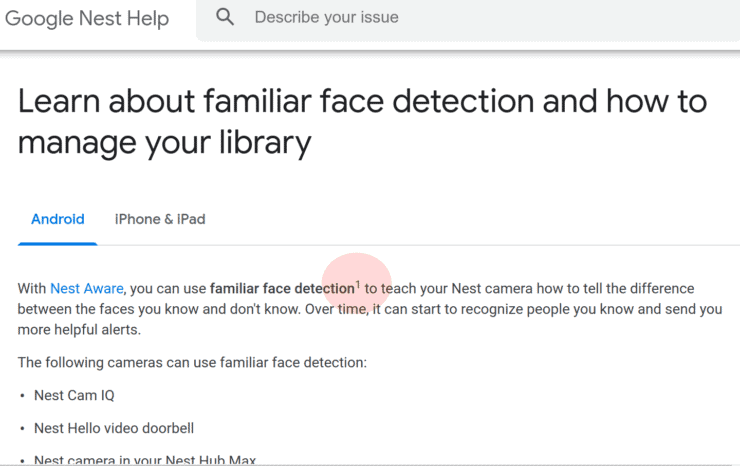When you’re looking at Nest’s smart doorbells and cameras, you may see a symbol (indicating a footnote) whenever “familiar face detection” is mentioned:

So what does this suspicious footnote mention? Scrolling down to the bottom of the page says:
(1) Nest’s familiar face detection feature is not available on Nest Hub Max used in the EU or Nest cameras used in Illinois. Certain state legislation may affect Illinois customers’ use of the feature, so we’ve turned it off as a precaution. If the home where you use your camera is in Illinois, you can’t turn on familiar face detection in the Nest app.
Google Nest support pages, as of August 2020
In other words…
The Nest Cam IQ range and the Nest Hello doorbell cannot use the familiar face detection feature in Illinois due to BIPA 2008, and this same feature is not allowed on the Nest Hub Max throughout the European Union. This is due to privacy laws, but various other Nest features do still work.
Which Nest products are affected
The privacy laws in Illinois and the EU work in different ways, and hence they target different products. Plus not all products in a range are affected. For example, the Nest Indoor Cam isn’t affected in Illinois but the Nest Indoor Cam IQ is affected. This is because of the extra features it offers (which I cover later). To sum up which products are affected:
| Device | Type | Affected in Illinois | Affected in EU |
| Google/Nest Mini | Smart speaker | No | No |
| Google/Nest Home Hub | Smart speaker | No | No |
| Nest Hub Max | Smart speaker with camera | Yes | Yes |
| Nest Hello | Smart doorbell | Yes | No |
| Nest Protect | CO/Smoke detector | No | No |
| Nest Secure | Alarm system | No | No |
| Nest Cam Indoor | Smart camera | No | No |
| Nest Cam Indoor IQ | Smart camera | Yes | No |
| Nest Cam Outdoor | Smart camera | No | No |
| Nest Cam Outdoor IQ | Smart camera | Yes | No |
| Nest Learning Thermostats | Smart thermostats | No | No |
| Google/Nest WiFi | Nest WiFi system | No | No |
| Chromecast | Content streamer | No | No |
| Nest x Yale Lock | Smart lock | No | No |
What is familiar face detection?
When you pay for a Nest Aware plan, you can get access to the ‘familiar face detection’ feature which learns the faces of your visitors (such as friends, family and delivery couriers) and learns who are familiar (i.e. regular visitors) and who are not (e.g. potential door-to-door sales people).
Once familiar face detection is enabled, Google’s AI will start doing extra processing against any recorded video clips. This will detect people in the clips, and read their faces using facial geometry and other categorization methods. If the face has been seen before, this is grouped together with previous similar clips – allowing you to see all clips for this particular person.
If the detected face has not been seen before (i.e. is an ‘unfamiliar face’), you’ll get a notification in your Google Home (or Nest) app asking you if it’s someone you know. If you say yes, this face is saved to the familar face library – allowing future clips containing this person to be recorded accordingly.
Outside of Illinois, Google just remind you to get the person’s permission before you save their face to the app – but there’s nothing that forces you to actually get permission.
If you have multiple Nest cameras, you can choose whether to turn familiar face detection on or off per camera. For any which have it disabled, you can still get motion and people based alerts, but you just won’t get the extra facial recognition processing and ‘save this face?’ prompts in the app.
This is quite a nice feature, especially since you can name people (based on their faces) and also combine faces that were identified as separate people (i.e. if one person has been flagged up as 2 or more different faces). It’s nice to know at a glance who visited you, and when. This compares to Ring which requires you to go into each video clip and watch them, to know who visited you – a fairly time consuming process.
Equally, if you’re noticing that an unfamiliar person keeps visiting you – especially when you’re out or when it’s darker – it might be that they’re casing out your home. Familiar face detection can help you to keep an eye on all their visitors to (or near) your house, and then act accordingly – e.g. to ring local law enforcement if required.
Why your Nest camera may be pointless

If you go onto Google Nest’s store and compare the Nest Indoor Cam to the Nest Indoor Cam IQ, you’ll see that the IQ range is all about extra processing power to give it extra smartness – such as recognising people, and supersight. For example, the following is mentioned on the IQ cam (but not the base model:
- “Nest Cam IQ has serious processing power, so it can do things like tell a person from a thing. And even recognize faces with Nest Aware.¹”
- “What do you get when you combine a 4K sensor with HDR and intelligent imaging? Supersight. It’s a sharp new way to look after home.”
Whilst supersight is a nice feature that does work in Illinois, you’ll notice the all-too-familiar “1” footnight on the “recognize faces” selling point.
Scrolling down, you’ll again see that this feature isn’t available in Illinois. The same is true of the Nest Cam IQ Outdoor. Facial recognition is the biggest selling point of the IQ cameras (compared to their base model) – it’s one of the first features mentioned on the sales page, and it’s a big reason that people upgrade to it.
However since this is banned in Illinois, it means that the only features you’re getting for more than double the price ($129.99 base cam, $299 IQ cam) is:
- Supersight
- 7x more powerful speaker
- 2x brighter LEDs
Whilst this is handy, it’s not really worth $170 more than the base cam – and so many people feel that their IQ cameras are pointless if they live in Illinois.
Why Nest cameras & doorbells are affected in Illinois
As you can see above, the two Nest Cam IQ cameras and the Nest Hello are affected by state legislation in Illinois, as is the Nest Hub Max (which contains a camera that supports familiar face detection). But what actually is this legislation, and why does it affect Nest cameras but not smart cameras from other companies?
In 2008, the Illinois General Assembly passed the Biometric Information Privacy Act (also called BIPA), codified as 740 ILCS 14 as part of a civil liberties push. This legislation prevents the use of companies and individuals from collecting and processing biometric information – including data from facial recognition technology – without express prior written approval.
In addition to a written release, the person who’s facial geometry has been analyzed and saved must be notified the purpose of the collection/storage and how long it’ll be collected and stored for. If any of these conditions aren’t met, fines of between $1,000 and $5,000 must be paid from the data collector (e.g. the owner of a relevant Nest device) to the visitor.
Assuming these fines are paid easily and the visitor needs to take the data collector to court, you’d be responsible for paying the visitor’s expert witness fees, litigation expenses and attorney fees if they won the case against you.
In short, BIPA is a fairly strict regulation which you wouldn’t want to mess around with – and hence the familiar face feature has simply been disabled by Google in Illinois.
Of course, I keep saying “you” in the above. Whilst you own the Nest device, Google Nest are the ones who control it and do the actual facial recognition. Google then will collect and store people’s facial geometry patterns, and use them later on (as part of the familiar face feature). Hence it could be argued that “you” wouldn’t be directly responsible under this legislation, but Google would.
Naturally though, there’s no point in taking a chance – hence this feature being unavailable.
I don’t live in Illinois and I’ve still impacted!
I’ve heard of various users who live in Iowa (right over the river from Illinois) or also Indiana get impacted by the familiar face ban in their Google/Nest app’s.
This is because Google use various methods to determine someone’s location, including an IP address geolocation. This uses a frequently updated IP address database to roughly determine where you might live.
Unfortunately if you live near Illinois, it’s possible that your internet service provider is using IP infrastructure located within Illinois – hence Google thinking you live there, and banning your use of this feature.
If this happens to you, firstly double check that your registered camera addresses and billing addresses definitely aren’t in Illinois by mistake. Once this is ruled out, check an IP address geolocation tool to see whether your IP is located within Illinois.
If it is, contact your ISP and explain the problem, asking if they’re able to change things so that you only get a local-state IP.
They may not be able to do this, however, so if all else fails, contact Nest live support and try and go down that route.
Why the Nest Hub Max is solely affected throughout the EU
As touched upon earlier, the Nest Hub Max contains a Nest camera. This also has familiar face detection as part of the Nest Aware subscription, but it’s another “footnote” item. In other words, this familiar face feature has been turned off in the EU – but only for the Nest Hub Max. Familiar face detection still works for the Nest Hello, and Nest Cam IQ cameras.
Unfortunately the exact reason for this is not known – it’s not been publicized or debated anywhere near as much as the Illinois BIPA laws.
The EU originally sounded quite tough on banning facial recognition in certain cases, but have been slow to implement specific legislation to ban it. It’s known that the 2018 GDPR regulations do cover biometric data (such as facial images and fingerprints), and also that the EU do plan on passing more facial recognition laws in late 2020, so perhaps the Google lawyers seen something in these that meant that they have stopped familiar face detection purely in the Nest Hub Max?
But as I say, that’s mainly speculation. I’m not a lawyer and I – just like much of the internet – am unsure why EU regulations have prevented a single feature on a single Google Nest device.

If you have any questions, feedback or suggestions about this article, please leave a comment below. Please note that all comments go into a moderation queue (to prevent blog spam). Your comment will be manually reviewed and approved by Tristan in less than a week. Thanks!